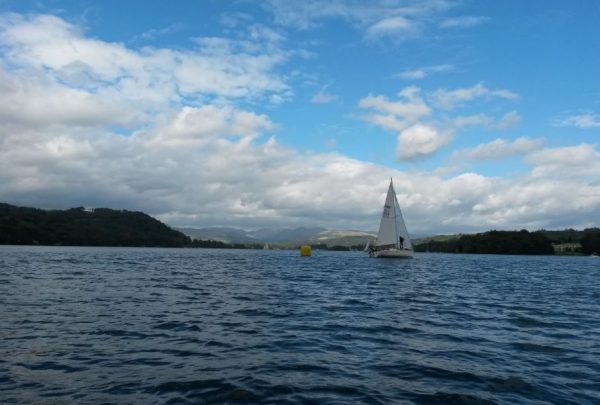New ‘Love Windermere’ partnership launched
7 July, 2022
by Rachael Halhead
The new “Love Windermere” partnership is a group of organisations from across South Cumbria that have come together to tackle the challenges facing Lake Windermere.

Nutrients, climate change, more extreme weather patterns and increased seasonal tourism have started to put the lake and its water quality under increasing pressure. These factors are causing ever increasing problems to the ecology of the lake, including an increased number of algal growths and a decline in wildlife and biodiversity.
Members of the partnership are from a broad range of sectors. Led by the Environment Agency, the partnership includes the Freshwater Biological Association; Lake District Foundation; Lake District National Park Authority; National Farmers Union; National Trust; South Cumbria Rivers Trust (SCRT) and United Utilities.
The group is developing evidence-based, long-term plans to maintain and improve water quality in the lake while balancing the needs of nature, the community and the local economy. One of the first aims of the partnership is to collate more scientific evidence to understand which solutions will be most effective and to help prioritise activity.
A citizens’ panel was also hosted recently by the Environment Agency, to engage with the community and raise awareness of the challenges affecting the lake. More than 20 residents got involved and gave their recommendations on where they want to see action start.
Members of the partnership have already started programmes of work, including;
-
Freshwater Biological Association – “Love Your Lake – The Big Windermere Survey”, with 100 volunteers sampling water at various points around the lake and its tributaries, due to produce the largest ever one-day snapshot of conditions in Windermere.
-
United Utilities – working with food outlets and restaurants in and around Windermere with tips to avoid constricting sewers with fatty waste which can lead to sewage spilling into the environment.
-
The Environment Agency will take samples and monitor water quality at four bathing water locations on Windermere until the end of the bathing water season in September, while farm inspections across the catchment will continue to focus on reducing diffuse pollution.
-
South Cumbria Rivers Trust is working with volunteers to restore reed beds around the whole lake, encouraging natural processes to remove nutrients from the lake sediment.
-
The Lake District Foundation will work with septic tanks owners to develop community emptying schemes and best management practice. SCRT have already produced guidance for septic tanks and how to maintain them. Click here for further information.
-
United Utilities is working with food outlets and restaurants in and around Windermere with tips to avoid constricting sewers with fatty waste which can lead to sewage spilling into the environment.
So what are SCRT doing?
- We are working with volunteers to restore reedbeds around the lake this summer/winter, in order to restore over 800sq m of this declining habitat. Reeds act as natural pollutant filters and are vital habitat for birds, fish and invertebrates, which is why they are so important to the local ecosystem. See our project here: CaST – Lake Windermere reedbed restoration
- We are trialling innovative technology to remove phosphates from septic tanks at source. Phosphates cause algal blooms. In partnership with United Utilities and support from Environment Agency. See our project here: Windermere- Water is Life Project
- Staff continue to sample seven key locations around Lake Windermere every two weeks, to understand pressures on the catchment and gain vital data about water quality, tourism and climate. We will be publishing these findings soon, so a peer review can be conducted.
- We co-ordinate Balsam Bashes and contractor spraying for invasive species around the lake. Please contact us if you spot some.
- We have developed a Water Quality Map to report pollution events around the lake. Make pollution more visible. Report it here.
The work to improve Windermere will be a long-term challenge, and there is still much to learn about the complex issues affecting the lake. However, it is hoped that the collaborative approach demonstrated through Love Windermere could set out a blueprint for improving the health of rivers and lakes across the UK.




